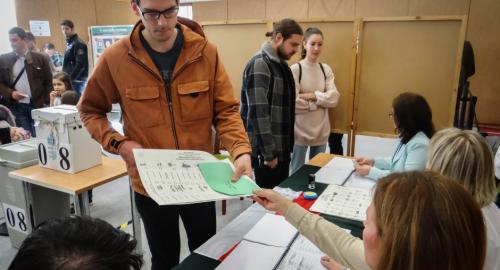Overlap of state and ruling party resources undermines contestants’ ability to compete on equal basis in Hungary elections, OSCE/ODIHR observers say
Hungary’s 8 April parliamentary elections were characterized by a pervasive overlap between state and ruling party resources, undermining contestants’ ability to compete on an equal basis, the observers from the OSCE Office for Democratic Institutions and Human Rights (ODIHR) concluded in a preliminary statement on April 9. Voters had a wide range of political options, but intimidating and xenophobic rhetoric, media bias and opaque campaign financing constricted the space for genuine political debate, hindering voters’ ability to make a fully informed choice. The technical administration of the elections was professional and transparent, the observers said.

A voter in Budapest receiving his ballot for Hungary's parliamentary elections, 8 April 2018.
Fundamental rights and freedoms were respected overall, but exercised in an adverse climate, the statement says. Access to information as well as the freedoms of the media and association have been restricted, including by recent legal changes.
“While voters were presented with clear options in these elections, the shrinking of space for genuine debate hindered their ability to make a fully informed choice,” saidDouglas Wake, Head of the ODIHR limited election observation mission. “Public funding measures and limits on spending, for example, are in place to secure equal opportunities, but the government’s excessive spending on ads that amplified the ruling coalition’s campaign message undermined contestants’ ability to compete on an equal basis.”
The election administration fulfilled its mandate in a professional and transparent manner and enjoyed overall confidence among stakeholders, the statement says. This included special efforts made to ensure full participation of persons with disabilities in the electoral process.
“The laws and regulations provide an adequate basis for democratic elections, but final reports by previous missions have offered ways to improve this framework,” Wake said. “Unfortunately, recent amendments to election-related laws were a missed opportunity to hold inclusive consultations and address prior ODIHR recommendations.”
Media coverage of the campaign was extensive, yet highly polarized and lacking in critical analysis. The public broadcaster fulfilled its mandate to provide free airtime to contestants, but its newscasts and editorial outputs clearly favoured the ruling coalition, the observers said. Most coverage by commercial broadcasters was partisan, favouring either ruling or opposition parties. Online media did provide a platform for pluralistic, issue-oriented political debate.
Women remain underrepresented in political life and there are no legal requirements to promote gender equality in the electoral context. Although one major party placed a woman at the top of the national list and some parties addressed gender-related issues in their programmes, empowerment of women received scant attention as a campaign issue, including in the media, the observers said.
While the laws provide for international observers, citizen election observation is not permitted. Legislative constraints and intimidating rhetoric by the government stifled civil society’s involvement in election-related activities, limiting the public’s access to non-partisan assessment of the process.
Source: Organization for Security and Co-operation in Europe
- 379 reads
Human Rights
Ringing FOWPAL’s Peace Bell for the World:Nobel Peace Prize Laureates’ Visions and Actions

Protecting the World’s Cultural Diversity for a Sustainable Future

The Peace Bell Resonates at the 27th Eurasian Economic Summit

Declaration of World Day of the Power of Hope Endorsed by People in 158 Nations

Puppet Show I International Friendship Day 2020

